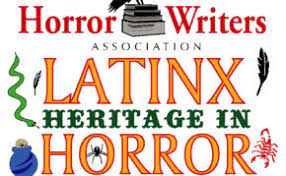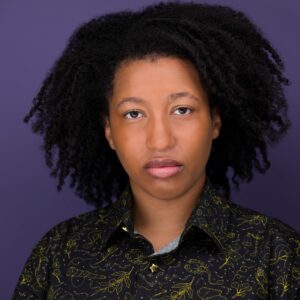Latinx Heritage in Horror: Interview with Vincent Tirado


Photo credit: Kevin Peragine Photography
Vincent Tirado is a non-binary Afro-Latine Bronx native. They ventured out to Pennsylvania and Ohio to get their Bachelor’s degree in biology and Master’s degree in bioethics. Their first novel, Burn Down, Rise Up (2022) was recognized with the Pura Belpré Award, and nominated for both the Bram Stoker and Lambda Literary Award. We Don’t Swim Here (2023) is their newest novel. When they’re not writing, you can catch them playing video games or making digital art. Find them on Twitter @v_e_tirado or visit them on their website www.v-e-tirado.com for more information.
What inspired you to start writing?
I feel bashful about this kind of question because I don’t think I was ever really inspired to start writing. I started writing because it was fun and didn’t require much from me other than a paper, a pen, and an idea. There was never a big ‘a-ha’ moment or a beautiful scenery that inspired my spirit to write the next great American novel. Writing was a thing I did for me and me only—until someone showed interest in what I was doing. It didn’t occur to me until much later that I could actually write a book but up until then, I was simply writing the way people breathe—it was just a natural flow.
What was it about the horror genre that drew you to it?
Sometime during college, I committed myself to watching a ton of horror movies. I don’t really remember why, I think it was because a lot of my friends were constantly talking about the latest flick that I was too afraid to watch. But during this semester, I would force myself to sit down and watch at least one horror movie a day. I’d watch Cloverfield and Blair Witch and The Conjuring and eventually came across Shudder, where finding horror became as easy as a click of a button. I became interested in anything horror that way, going from movies to podcasts to short stories and then novels. I just couldn’t get enough of it and right now, I still can’t.
Do you make a conscious effort to include LatinX characters and themes in your writing and if so, what do you want to portray?
I don’t think it’s a conscious effort. That’s like asking if I make a conscious effort to write about humans. I am a human, so that’s what I write. I am Latine, so that’s also what I write. When it comes to themes, I also explore other parts of my identity, like my Blackness, my queerness, or my gender identity, usually through a horror lens like body horror or existential terror. There’s something very fun about taking aspects of myself and putting a fear filter on it to really reflect on it.
What has writing horror taught you about the world and yourself?
Horror has taught me that life and people can be stranger than fiction. The best horror stories are often the ones where the characters truly feel complex and yet still relatable. The ones where you can peel apart layers and find something more underneath. I’ve always thought of myself as a very boring, simple person. But I think horror has delighted me in showing me that I’ve got my own unique bag of experiences that I can draw from to write horror.
How have you seen the horror genre change over the years? And how do you think it will continue to evolve?
I think the horror genre is starting to fill in the gaps and finding its people. When I was younger, I only heard about horror movies through the grapevine. YA Horror didn’t really exist. You went from R.L. Stine to Stephen King and hoped it wouldn’t terrify you too much. Now there are subscription services catering to horror like Shudder and Screambox. A lot more YA horror is coming out. It’s exciting to see and I hope we don’t lose momentum.
How do you feel the LatinX community has been represented thus far in the genre and what hopes do you have for representation in the genre going forward?
It can be a mixed bag sometimes. Like any marginalized community, there where always be poor representation among the good ones—so it’s important to focus on the good and celebrate them. However, I also hope that the LatinX community is supported in doing so. If you invite wolves into a room with sheep, you’re going to end up with a room full of wolves. If we are not supported going forward, it will only serve to keep the status quo and push more of us out.
Who are some of your favorite LatinX characters in horror?
Guillermo De La Cruz from What We Do In The Shadows, hands down. But also the entire cast of Los Espookys will always have my heart. Nothing would fill me with more glee than being able to work with the Los Espookys producer Julio Torres on a horror project.
Who are some LatinX horror authors you recommend our audience check out?
Diana Rodriguez Wallach and Silvia Moreno-Garcia are two that definitely come to mind. Diana for those who want more YA horror and Silvia for adult horror, you can never go wrong with either of them.
What is one piece of advice you would give horror authors today?
You can find horror in anything. You can find terror in anything. You can make people associate negative feelings with something as innocuous as an apple peeler. Never feel like you’re hitting a wall or that you’ve explored all that you can in horror. Take a break if you have to, but don’t let it push you out. There is so much out there to discover.
And to the LatinX writers out there who are just getting started, what advice would you give them?
Let no one take your pen from you. The only thing you need to be a writer is to write. It’s not restricted to one race or ethnicity or to anything else. As long as you have a pulse, you can be a writer. Anyone who tells you otherwise probably hasn’t been cursed out enough. Feel free to change that.



